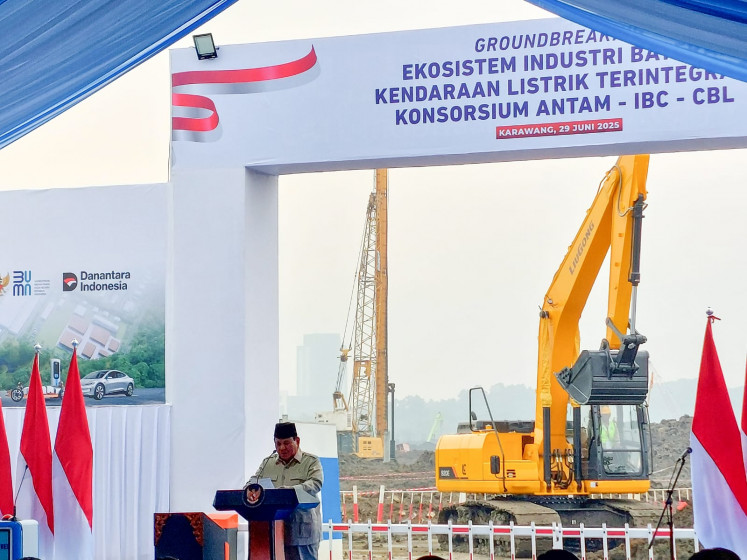Popular Reads
Top Results
Can't find what you're looking for?
View all search resultsPopular Reads
Top Results
Can't find what you're looking for?
View all search resultsThoughts on introducing the right incentive schemes to reward quality performance in your workplace
How can you explain US$616 million in individual bonuses coupled with $25 billion of corporate losses in a single year?The role of AIG as a catalyst for the financial crisis has been well documented
Change text size
Gift Premium Articles
to Anyone

H
ow can you explain US$616 million in individual bonuses coupled with $25 billion of corporate losses in a single year?
The role of AIG as a catalyst for the financial crisis has been well documented. Less well known is how its short-term incentive schemes were instrumental in pushing the world's largest insurance company to the brink of bankruptcy. The epicenter of the problem revolved around a small AIG subsidiary in Mayfair that was selling credit default swaps by the billions.
In order to maximize profits, and consequently bonuses, most of these bets were not properly hedged. This story was repeated many times across the financial sector, as myopic incentive programs drove destructive behavior that severely weakened global markets.
While AIG provides an extreme example, many companies have incentive schemes that drive undesirable or counter-productive behavior. Here are a few of the more common bad practices:
'¢ Companies that ask for long-term thinking, but primarily reward short-term financial performance.
'¢ Companies that extol the importance of innovation, but at the same time discourage experimentation and punish failure. Innovative thinkers quickly get the message and move on.
'¢ Companies that seek more collaboration and team work, but base their compensation schemes on individual performance.
'¢ Companies that hand out merit increases on the basis of seniority, union rules or in such insignificant amounts that no employee is truly motivated to excel.
'¢ Companies that reward top-line growth, and are then surprised when costs spiral out of control and profits sag.
Good management
Some CEOs have started to challenge some of the assumptions about how rewards are delivered. In 2009, Guy Laurence came onboard Vodafone UK to find a culture of firefighting. Teams that could solve all manner of problems on very short notice were highly regarded and richly rewarded.
Laurence commented: 'We had developed a kind of Dunkirk culture, where formal and informal rewards were showered on people who could get us out of all kinds of trouble. This sent out completely the wrong message. We shouldn't be providing any special rewards to the people who fight our fires; we should be rewarding the people who prevent the fires from starting in the first place.'
Consequently, he took away the special recognitions and payouts and instead, made a point of publicly rewarding employees who developed proactive solutions to anticipate and avoid problems.
'Often, I would send a team to deliver a bottle of champagne to someone's desk, right in the middle of the work day, so everyone noticed.'
In Laurence's book, if you want quality, you better have in place a compensation structure that does not reward quantity, and does not place the urgent over the important.
What can you do to avoid such mistakes?
The most important step to good incentive management is to tie rewards directly to a clear set of strategic priorities. While this may sound straightforward, we are continually amazed by how many firms make bold strategic shifts without adjusting their reward systems to reflect the new focus.
'¢ When your strategy depends on innovation, make sure that you promote a culture of psychological safety, where experimentation is encouraged and failure is tolerated.
'¢ Balance rewards among financial goals. If you only reward revenue growth, then costs and complexity normally follow. If you just focus on cost reduction, then you could easily miss key market changes.
'¢ If you want to build long-term relationships, then allow time and space for these to develop. For example, if you want your sales people to provide high levels of service to existing customers, then don't base their bonuses on generating new leads.
'¢ If you want your managers to become more globally minded, then tie their rewards, at least in part, to consolidated group performance.
The fight goes on
Unfortunately, there is little in today's noisy discussion about bankers' bonuses that suggests a significant change in direction. AIG has once again handed out bonuses in the hundreds of millions, this time to a new set of 'clean up' managers.
In our experience, few companies have taken a hard look at their incentive schemes to ensure that they are constantly and consistently aligned with their strategies. Indeed, changes in rewards often significantly lag changes in strategy, if they come at all. We recommend that you take a good look inside your organization to make sure it's not one of the offenders.
Theodore Peridis is visiting professor at IMD (www.imd.org) and professor of Strategic Management and International Business at the Schulich School of Business at York University in Toronto. Michael Wade is a professor of Innovation and Strategic Information Management at IMD. They both teach on the Orchestrating Winning Performance program (OWP).









